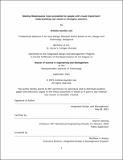Making Makerspaces more accessible for people with visual impairment: Understanding user needs to reimagine solutions.
Author(s)
Jain, Kritisha Kantilal
DownloadThesis PDF (5.108Mb)
Advisor
Seering, Warren
Terms of use
Metadata
Show full item recordAbstract
The maker revolution came about as a relief to passionate tinkerers and makers. It made making approachable. This attracted millions of collaborators and empowered them to express their imagination through tangible results. But, one subset of tinkerers and makers that this revolution hasn’t successfully included is people with disabilities who face significant barriers to Making, the irony being that this group stands to benefit the most from this revolution.
As a response, I am asking a fundamental question - How Might We Make Makerspaces More Accessible to People with Visual Impairment? For this, I draw on examples from a series of interviews and workshops where I introduced hardware machines to blind hobbyists and guided assembly of a corn sheller pioneered at the MIT D-Lab workshop. This allowed me to understand the real needs, desires and frustrations of this group at a more intricate level and hence let me collaborate with them on ways to achieve the goal of making makerspaces within the MIT ecosystem more accessible as a first step through a guided workshop at the MIT D-Lab. This exploration has culminated into a bedrock of foundational knowledge that can be used to further work in this area and a set of robust suggestions that are applicable to all makerspaces - not just within MIT. The study has kept the group of potential benefactors at its fulcrum through every step of the process - from exploration to testing of solutions in an agile, iterative, human-centered manner.
Date issued
2021-09Department
System Design and Management Program.Publisher
Massachusetts Institute of Technology